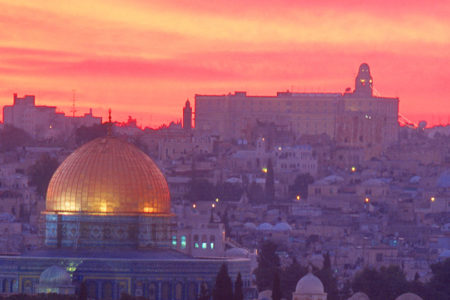Handshakes and High Hopes
Special Report: Israeli-Jordanian Peace Agreement
It was a photograph far more captivating than the proverbial “a picture is worth a thousand words” theme. The Royal Jordanian jet with King Hussein on board was flying in lazy circles at low altitude over the city of Jerusalem. Just off the wing and slightly above was an Israeli Air Force fighter jet flying escort for the king and his entourage. The eye line was perfect. The royal seal of Jordan marking the tail of the larger plane was juxtaposed with the Star of David emblazoned under the wing of the Israeli F-15.
From ground to air there was an even more telling linkage. Prime Minister Rabin was on the phone with the king. “Welcome to Israel,” he said, “even though it is in the air.” The king replied, “It’s wonderful to be overflying your country for the first time in a civilian airplane, sir…To the people of Israel and yourself, all our best wishes, and our prayers for peace, shalom.”
Although it was all high symbolism and invigorating visual imagery, the events on the Israeli-Jordanian border, in Washington, D.C., and in the sky over Jerusalem had long been viewed as an eventual sure thing. Since 1967 the Jordanian border had been virtually trouble free. Hussein showed no inclination to perpetuate hostile relations with his neighbor. As a matter of fact, face-to-face meetings and contacts on issues of mutual interest to both countries had been carried on for years. A de facto peace agreement existed between the two; the pageantry made it official.
The driving force behind Hussein’s willingness to drop the “perpetual state of war” facade was an ample dose of political realism. Yasser Arafat’s drive for a Palestinian state with a capital city in Jerusalem was something the king could ill afford to leave unchallenged. For Israel, it brought a much-welcomed new factor into the peace process. For one thing, Israel has no desire to exercise control over Islamic shrines in Jerusalem. They have, however, no inclination to grant oversight of these sacred places to Arafat and his terror-prone Palestinians. The very thought of hearing Muslim voices in the Al Aksa Mosque on the Temple Mount echoing Arafat’s Johannesburg call for a Jihad (holy war) to seize Jerusalem is a chilling prospect for Jews and Christians alike.
Breaking free of Syrian intimidation was another positive aspect of Jordan’s agreement with Israel. Syria’s virtual annexation of Lebanon and President Assad’s willingness to use his considerable military power against Arab brothers was a reality not lost on the Jordanians. Now that Jordan has made the break, the focus on who will be next to bow to historical reality and recognize Israel’s right to exist has shifted to Syria. It will be interesting to see how Assad reacts. Will he turn his terrorist cohorts loose on the Jordanians, or begin more serious negotiations with Israel?
The question on many minds is whether Jordan’s peace with Israel will have a significant bearing on Syria’s demands for a full return of the Golan Heights before serious talks begin. A companion question relates to Israel’s willingness, in light of the new situation, to stand tough on the issue of how much they are willing to concede to Syria on the Golan—a position that would certainly strengthen the current administration’s position among the Israeli people.
When all is said and done, however, of utmost importance to King Hussein and Jordan regarding their relationship with Israel is Israel itself. Whatever the king can do to contribute to a strong, stable Jewish state will inevitably help insure his nation’s welfare and security. There can be little doubt that Israel will prove to be a far more reliable ally than any Arab or Palestinian state in the region.
The Arab world is under siege by no-holdsbarred Muslim radicals dedicated to rule-or-ravage crusades the world over. Events in Algeria, which are ominously impacting France, are but one recent example of the political volatility created by religion-driven Islamic fanatics. If Israel is marked for conquest by these people, you can be sure that King Hussein and Jordan are also in the crosshairs. So, in actuality, what we are witnessing in the peace agreement between Israel and Jordan is a mutual-security pact that is of far different stuff than the tenuous deal struck with Arafat and the Palestinians.








